第5章 THE TALISMAN(5)
Fitful gleams of light gave a foreboding look to Paris; like a pretty woman, the city has mysterious fits of ugliness or beauty. So the outer world seemed to be in a plot to steep this man about to die in a painful trance. A prey to the maleficent power which acts relaxingly upon us by the fluid circulating through our nerves, his whole frame seemed gradually to experience a dissolving process. He felt the anguish of these throes passing through him in waves, and the houses and the crowd seemed to surge to and fro in a mist before his eyes. He tried to escape the agitation wrought in his mind by the revulsions of his physical nature, and went toward the shop of a dealer in antiquities, thinking to give a treat to his senses, and to spend the interval till nightfall in bargaining over curiosities.
He sought, one might say, to regain courage and to find a stimulant, like a criminal who doubts his power to reach the scaffold. The consciousness of approaching death gave him, for the time being, the intrepidity of a duchess with a couple of lovers, so that he entered the place with an abstracted look, while his lips displayed a set smile like a drunkard's. Had not life, or rather had not death, intoxicated him? Dizziness soon overcame him again. Things appeared to him in strange colors, or as making slight movements; his irregular pulse was no doubt the cause; the blood that sometimes rushed like a burning torrent through his veins, and sometimes lay torpid and stagnant as tepid water. He merely asked leave to see if the shop contained any curiosities which he required.
A plump-faced young shopman with red hair, in an otter-skin cap, left an old peasant woman in charge of the shop--a sort of feminine Caliban, employed in cleaning a stove made marvelous by Bernard Palissy's work. This youth remarked carelessly:
"Look round, monsieur! We have nothing very remarkable here downstairs; but if I may trouble you to go up to the first floor, Iwill show you some very fine mummies from Cairo, some inlaid pottery, and some carved ebony--genuine Renaissance work, just come in, and of perfect beauty."In the stranger's fearful position this cicerone's prattle and shopman's empty talk seemed like the petty vexations by which narrow minds destroy a man of genius. But as he must even go through with it, he appeared to listen to his guide, answering him by gestures or monosyllables; but imperceptibly he arrogated the privilege of saying nothing, and gave himself up without hindrance to his closing meditations, which were appalling. He had a poet's temperament, his mind had entered by chance on a vast field; and he must see perforce the dry bones of twenty future worlds.
At a first glance the place presented a confused picture in which every achievement, human and divine, was mingled. Crocodiles, monkeys, and serpents stuffed with straw grinned at glass from church windows, seemed to wish to bite sculptured heads, to chase lacquered work, or to scramble up chandeliers. A Sevres vase, bearing Napoleon's portrait by Mme. Jacotot, stood beside a sphinx dedicated to Sesostris. The beginnings of the world and the events of yesterday were mingled with grotesque cheerfulness. A kitchen jack leaned against a pyx, a republican sabre on a mediaeval hackbut. Mme. du Barry, with a star above her head, naked, and surrounded by a cloud, seemed to look longingly out of Latour's pastel at an Indian chibook, while she tried to guess the purpose of the spiral curves that wound towards her.
Instruments of death, poniards, curious pistols, and disguised weapons had been flung down pell-mell among the paraphernalia of daily life;porcelain tureens, Dresden plates, translucent cups from china, old salt-cellars, comfit-boxes belonging to feudal times. A carved ivory ship sped full sail on the back of a motionless tortoise.
The Emperor Augustus remained unmoved and imperial with an air-pump thrust into one eye. Portraits of French sheriffs and Dutch burgomasters, phlegmatic now as when in life, looked down pallid and unconcerned on the chaos of past ages below them.
Every land of earth seemed to have contributed some stray fragment of its learning, some example of its art. Nothing seemed lacking to this philosophical kitchen-midden, from a redskin's calumet, a green and golden slipper from the seraglio, a Moorish yataghan, a Tartar idol, to the soldier's tobacco pouch, to the priest's ciborium, and the plumes that once adorned a throne. This extraordinary combination was rendered yet more bizarre by the accidents of lighting, by a multitude of confused reflections of various hues, by the sharp contrast of blacks and whites. Broken cries seemed to reach the ear, unfinished dramas seized upon the imagination, smothered lights caught the eye. Athin coating of inevitable dust covered all the multitudinous corners and convolutions of these objects of various shapes which gave highly picturesque effects.
First of all, the stranger compared the three galleries which civilization, cults, divinities, masterpieces, dominions, carousals, sanity, and madness had filled to repletion, to a mirror with numerous facets, each depicting a world. After this first hazy idea he would fain have selected his pleasures; but by dint of using his eyes, thinking and musing, a fever began to possess him, caused perhaps by the gnawing pain of hunger. The spectacle of so much existence, individual or national, to which these pledges bore witness, ended by numbing his senses--the purpose with which he entered the shop was fulfilled. He had left the real behind, and had climbed gradually up to an ideal world; he had attained to the enchanted palace of ecstasy, whence the universe appeared to him by fragments and in shapes of flame, as once the future blazed out before the eyes of St. John in Patmos.